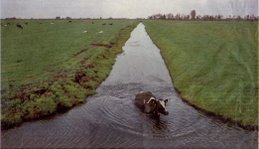 I do not claim exclusivity for the name "At Home in Europe". In 1993, some time before George Soros engaged into bringing democracy and moral integrity into Central and Eastern Europe, I embraced, together with my colleagues and friends from France, Germany and Great-Britain, in the small create!europe network, that challenging slogan. We were all working at urban neighbourhood emancipation through local integrated projects. Most of us, including me, still are.
I do not claim exclusivity for the name "At Home in Europe". In 1993, some time before George Soros engaged into bringing democracy and moral integrity into Central and Eastern Europe, I embraced, together with my colleagues and friends from France, Germany and Great-Britain, in the small create!europe network, that challenging slogan. We were all working at urban neighbourhood emancipation through local integrated projects. Most of us, including me, still are. George Soros became famous, when he speculated successfully against the British Pound (£) in 1992, forcing it out of the European currency "slang". Much of the money he got out of this disastrous (for Europe) move, was invested, later on, into a series of private initiatives for democracy and civil society in countries like Bosnia, Hungary, Serbia and the Ukraine. Showing, how you can throw bad money to good causes.
The New York based George Soros institute OSI (Open Society Institute) issues a report about Muslims in Europe, focussing on 11 European cities. It is produced by the OSI At Home in Europe Project , and covers:
the experiences of Muslim communities in select neighborhoods in Amsterdam and Rotterdam, Antwerp, Berlin and Hamburg, Copenhagen, Leicester and Waltham Forest–London, Marseille and Paris, and Stockholm.
The house is as the people who inhabit it. There is no mythical everlasting cultural "Heimat", defined by the soil upon which it stands.
In order to be at home in Europe, Muslim immigrants, each in function of his/her background (for coming from Morocco or from Turkey, from the province or from the city, makes quite a difference), creates his own form of integration, which is a new, mixed way of life. Like immigrants in the US did successfully in the nineteenth and twentieth century.
Does that mean, that there are no problems? That is another myth about us, "Gutmenschen", i.e., people who try to attack in fact the facts of ethnic cohabitation. Of course, there are huge problems, for the immigrants themselves as well as for the original inhabitants of the area.
The report shows, that, with good will from both sides and much help from the local authority, those problems can be solved, and, astonishingly, even turned into advantages!
How this last, seemingly improbable, magic trick can be made in the course of time, is explained (among others) in my professional website E-Urban, about urban area-oriented policies in Europe.
This is a summary of the report's contents:
Muslims in Europe: A Report on 11 EU Cities
The Open Society Institute Muslims in Europe report series constitutes the comparative analysis of data from 11 cities in seven European countries. It points out common trends and offers recommendations at the local, national, and international levels, including to the European Union and to international organizations. While not representative of the situation of all Muslims in these cities, this report does capture a snapshot of the experiences of Muslim communities in select neighborhoods in Amsterdam and Rotterdam, Antwerp, Berlin and Hamburg, Copenhagen, Leicester and Waltham Forest–London, Marseille and Paris, and Stockholm.
This body of work comes in response to major trends with regards to Muslims living in Europe: whether citizens or migrants, native born or newly-arrived, Muslims are a growing and varied population that presents Europe with one of its greatest challenges, namely how to ensure equal rights and opportunities for all in a climate of rapidly expanding diversity.
The following overview report includes:
- Executive Summary
- Policy Context
- Cohesion, Belonging, Discrimination and Interactions
- Education
- Employment
- Neighborhood and Housing
- Health Care
- Policing and Security
- Civic and Political Participation
- Media
- Recommendations
The publication is available for download below, in its entirety or by chapter.
(For downloading, go to the OSI At Home in Europe Project).
From the conclusions of the report:
(Hat tip to Dagmar and Mario, Germany).“The OSI research suggests that religious discrimination against Muslims remains a critical barrier to full and equal participation in society.The findings of this report are consistent with other research and suggest that levels of religious discrimination directed towards Muslims are widespread and have increased in the past five years.
European-born Muslims, particularly women, were more likely to perceive higher levels of religious discrimination than Muslims born abroad. European-born Muslim men identify the police as a key source of unfair treatment and discrimination. For Muslims, the persistence of discrimination and prejudice affects their sense of national belonging."
There report is based on more than 2.000 interviews of inhabitants of the eleven European cities.
"Too many Europeans believe, that the religious identity would somehow hinder the integration [of Muslims], allthough a majority of the Muslims who have been interviewed, identify to a high degree with the city and with the country in which they live. The role of the City is essential, as well in the struggle against discrimination, as well as in the opening of roads to the integration of foreigners",said Nazia Hussain (London), who managed the project "At Home in Europe".
A useful antidote against the "Atlas der Wut" (Map of Rage) that Mr. Ulfkotte distilled recently from another US source...




 (Borissov, the virtually nominated prime minister, said on July 9, 2009: I have a program of support to the legal officers who are charged with corruption cases, we are going to invest massively into infrastructure and in European cooperation ... [Photo: Sofia Echo, Krassimir Yuskesseliev])
(Borissov, the virtually nominated prime minister, said on July 9, 2009: I have a program of support to the legal officers who are charged with corruption cases, we are going to invest massively into infrastructure and in European cooperation ... [Photo: Sofia Echo, Krassimir Yuskesseliev]) In the second half of the 19th century, a seemingly unimportant province of the Ottoman empire woke up. The decline of the Ottoman Empire was certainly of much help. But the emancipation of inhabitants of remote villages, of virtual serfs to absenteist Turkish landowners and of artisans working in the few cities that existed, could not have been imagined without the intervention of an European educated elite of former university students and freemasons. Like the 18th century enlightened intellectuals in France and elsewhere, they concentrated on popular education. It is by force of that drive, that a new Bulgarian nation came into existence on the vague memories of mediaeval culture. It was a very real Renaissance. The Bulgarian Renaissance.
In the second half of the 19th century, a seemingly unimportant province of the Ottoman empire woke up. The decline of the Ottoman Empire was certainly of much help. But the emancipation of inhabitants of remote villages, of virtual serfs to absenteist Turkish landowners and of artisans working in the few cities that existed, could not have been imagined without the intervention of an European educated elite of former university students and freemasons. Like the 18th century enlightened intellectuals in France and elsewhere, they concentrated on popular education. It is by force of that drive, that a new Bulgarian nation came into existence on the vague memories of mediaeval culture. It was a very real Renaissance. The Bulgarian Renaissance. I spoke with a young woman student, at the start of this year. She won a grade in classical philosophy at Sofia University. I told her, that I was confident, that out of the actual mess of Bulgarian culture, something new and vigourous would develop. But she cut me short. She explained to me, examples at hand, that the nearly half a century cultural desert and all the repression that went with it, killed any hope for creativity and free intellectual life. I was dumbfounded. Who am I, to deny the artistic and cultural disaster that manifests itself daily in Bulgarian television, in the shows of the unexplainable Aziz?
I spoke with a young woman student, at the start of this year. She won a grade in classical philosophy at Sofia University. I told her, that I was confident, that out of the actual mess of Bulgarian culture, something new and vigourous would develop. But she cut me short. She explained to me, examples at hand, that the nearly half a century cultural desert and all the repression that went with it, killed any hope for creativity and free intellectual life. I was dumbfounded. Who am I, to deny the artistic and cultural disaster that manifests itself daily in Bulgarian television, in the shows of the unexplainable Aziz?
 A regional strategy, alas, is not an EU priority. The USA established a giant military base in Blagoevgrad, next to the Greek and Turkish borders. An American university in that city completes the deployment.
A regional strategy, alas, is not an EU priority. The USA established a giant military base in Blagoevgrad, next to the Greek and Turkish borders. An American university in that city completes the deployment.




